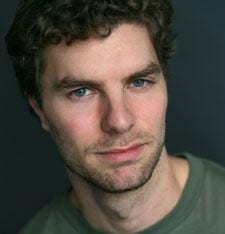Lance Horne is one of those über-cool theatre guys who epitomizes New York art chic. His impressive resumé as Emmy Award-winning composer, lyricist and performer defies typecasting: one day accompanying Cabaret cutie Alan Cumming, the next night punking out with Dresden Doll Amanda Palmer. Yes, this theatre queen is a little bit show tune and a whole lot of rock and roll.
Things started out traditionally enough. An adolescent stint in the Phoenix Boys Choir led to studies at the Interlochen Arts Company and, finally, to that holy grail of budding young musicians: Julliard. Six years and one master’s degree later, Horne began scoring work as an accomplished accompanist and innovative composer. Performances with cabaret folks like Kate Riggs (Songs for Mister Sister) and Melissa Madden Gray (Meow Meow) brought kudos and connections, as did rock gigs with his band The One Night Stands.
The eclectic Luminato fest is bringing Horne in for A Poe Cabaret: A Dream within a Dream, opening Mon, Jun 8 at Buddies in Bad Times Theatre. It’s an evening of song inspired by the deliciously maudlin US poet Edgar Allan Poe featuring the world premiere of commissioned pieces by Mike Ross and Alexina Louie in addition to Horne’s operatic adaptation of Poe’s short story “The Tell-Tale Heart.” A shorter version premiered last year in New York in a series of one-act operas inspired by Poe, Franz Kafka and Muriel Spark.
In a serendipitous unfolding of events, Luminato programmers heard about Horne’s Poe piece shortly after planning an evening of song devoted to Poe’s macabre scribblings. They approached the composer with a proposal to enlarge the piece, as well as taking part in the performance. Horne was quick to accept the invitation to accompany tenor Sean Clark, and set about rejigging his opera. Working with librettist Mark Campbell, the composer has lengthened the show, while making some changes in tone and presentation.
“The New York production was very sensual,” says Horne. “This production for Luminato has more of an overall dramatic arc. The choices made are more theatrical than operatic.”
Horne describes the piece as a “Sisyphusian retelling of the tale of guilt.” It follows the narrator through the premeditated murder (and subsequent dismembering) of a strange old man. The murderer’s guilt haunts him. He imagines the sound of his victim’s still-beating heat reverberating from beneath the floorboards, getting louder and louder as he questions his own sanity.
“This piece has a very macabre approach to it,” Horne says. “We match the beating heart with a certain musical fragment that feels like the flowing in and out of blood. It’s driving the whole libretto, with an explanation of what could either be extreme madness or just calculation.”
It’s a little surprising that this soft-spoken, cheerful man has long been fascinated by one of history’s most ghoulish bards.
“I’ve always felt a weird affinity for Poe,” he says. “I took a psychological literature course in college that spoke to me. I’ve always loved classic work and the process of adapting to it.
“Poe seemed such a strong operatic choice. He manages to find stillness in all the insanity, creating really beautiful passages and dropping them in the middle of really macabre settings.”

 Why you can trust Xtra
Why you can trust Xtra


